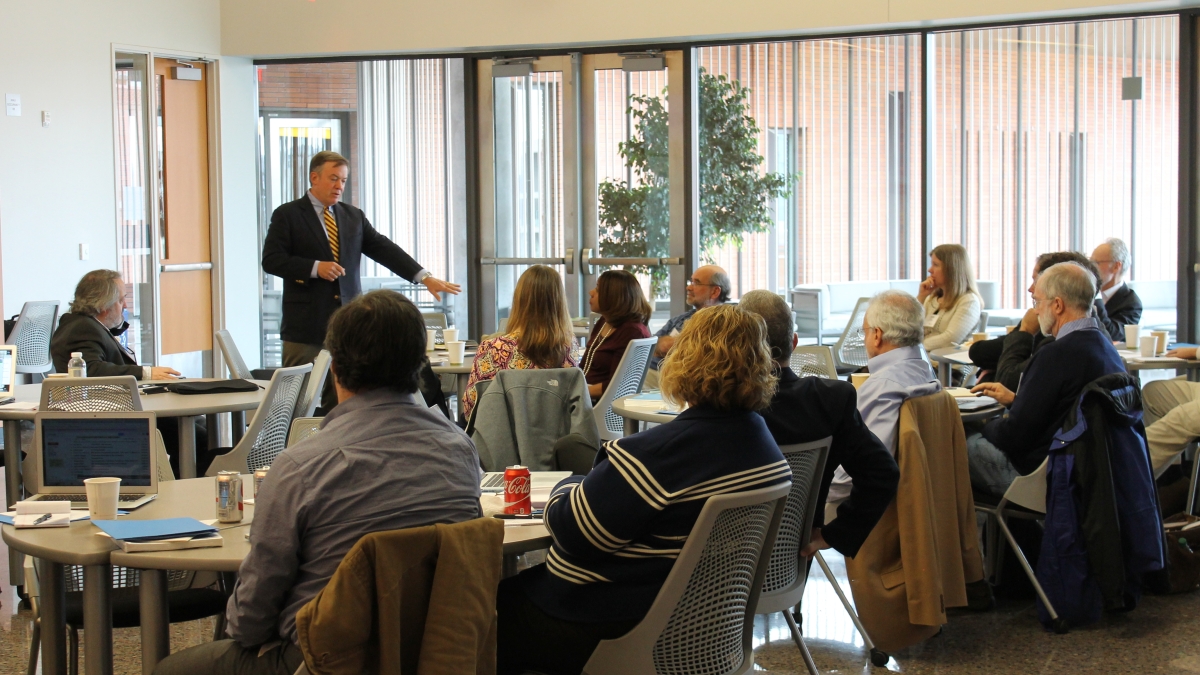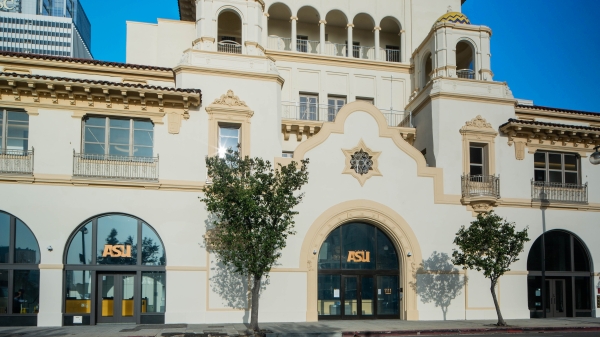Political developments complicate efforts in responsible innovation
ASU researchers are studying the effects of national political agendas on equity and ethics in science as part of an international study sponsored by the European Union

Michael Crow addresses attendees, including participants form ASU's Biodesign Institute, of the Responsible Research and Innovation Workshop at ASU.
For the last three years, a research team based at Arizona State University, led by the School for the Future of Innovation in Society Professor and Founding Director David Guston and graduate research assistant Tess Doezema, has been studying how scientists and government agencies in the U.S. understand responsibility. The project began with a workshop inviting key U.S. research and innovation stakeholders to weigh in on what it means to innovate responsibly, and how research practices and policy mechanisms might interact to achieve those goals. The workshop was followed by interviews with researchers at ASU’s Biodesign Institute and two focus groups addressing topics that arose through the research process: one on gender and diversity and one on open access and data and ethics.
The findings suggest that recent political developments have complicated the trajectories of these systems, especially in gender and diversity, open data and science education, rendering national policy and local practice uncertain in these areas.
What is responsible innovation?
Responsible Research and Innovation (RRI) looks for ways to think about the potential impacts of scientific discoveries and new technologies on society. It asks researchers to see themselves not merely as neutral contributors to an impersonal body of knowledge but rather as consequential actors within society and to reflect on how they do their work accordingly.
RRI also seeks to initiate positive change around the conditions for the production of knowledge itself — what incentives drive scientific knowledge production, and how can we rethink those incentives to get better outcomes?
“The European Union, which invests heavily in scientific research and development on behalf of its member nations, made RRI an important priority of its Horizon 2020 funding program,” explained Guston, who has been working on RRI for nearly two decades. “One of the large projects, involving about a dozen countries, asked us to be among the few non-European contributors to the research.”
Ensuring responsibility
This project, called RRI-Practice and led by a research team in Norway, identified a range of good practices for addressing these concerns across its participating countries. Guston and Doezema targeted their research to form a better understanding at both the federal government level in the U.S. and at the institutional level at ASU, with the understanding that what goes on in the lab is shaped by what happens in Washington and vice versa.
“It’s interesting to look at U.S. science policy and practices in terms of how the European Commission thinks about responsible research and innovation,” Doezema said. “Because our institutions and ways of approaching responsible innovation are quite different in many ways. The EC focuses on what it calls RRI keys — ethics, gender equality, science education, open access and societal engagement — which are all relevant in the U.S. context, but our thinking, our history, our funding mechanisms and our regulations around them are quite different. That’s the value of this project, getting to view all of these findings from around the world next to each other and thus getting a more nuanced idea about what responsibility means and what RRI could mean.”
Generally, at the federal level, legislation and executive orders address issues including ethics, gender equity and diversity and open access, while independent agencies like the National Science Foundation or mission agencies like the National Institutes of Health help fund research programs that address science education and social engagement. At the level of research performers like ASU’s Biodesign Institute, the strength of response to the RRI keys varies, depending on the particular kind of policy driver.
The study also finds that the high-profile reversals around gender and transparency that have occurred at the federal level have not stopped progress on broad trends toward creating more open and inclusive science at the individual institutional level. Specifically, these national developments do not appear to have penetrated to the level of the Biodesign Institute. Values and concerns consistent with past agendas in science policy continue to drive priorities and possibilities at Biodesign.
RRI cannot be achieved through closed, elite systems of inaccessible knowledge. It necessitates opening up institutions and making them inclusive to the range of experiences and perspectives that make up our diverse communities. RRI also means making scientific methods, findings and insights transparent and widely accessible, and developing techniques for science education that encourage ways of thinking about the world that transcend traditional disciplinary and culturally shaped boundaries.
The U.S. case study focused on Arizona State University’s Biodesign Institute and is now concluded. Read the full U.S. Case Study.
The project is funded by the European Commission, in the period 2016–2019. Read the EU Policy Brief.
More Law, journalism and politics

School of Politics and Global Studies director's new book explores mass violence
Why do people commit atrocities and why are certain groups, including religious and ethnic, more vulnerable to large-scale…

ASU faculty contributing to improvement of Wikipedia
Many academics have a love-hate relationship with Wikipedia. While the website has information about almost anything you can…

ASU Law students gain vital experience through Los Angeles location
Students at the Sandra Day O’Connor College of Law at Arizona State University may be concentrated in the school’s downtown…